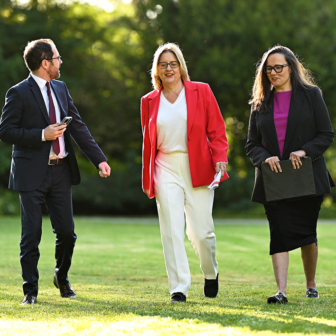Many people, even those working for the legalisation of illicit drugs, were surprised when Australia’s Therapeutic Goods Administration gave approval for psilocybin and MDMA to be used therapeutically in cases of severe and treatment-resistant depression or post-traumatic stress disorder. Psilocybin is the active ingredient in “magic mushrooms” and MDMA is also known as “ecstasy.”
Mind Medicine Australia, an advocacy group, was earlier knocked back when it sought to have the two substances legalised. On my reading, its bid had serious deficiencies: in particular, it cherrypicked studies rather than conducting a systematic review of all the evidence. In light of those problems, the TGA commissioned its own review of the evidence. The findings appear to have convinced the decision-makers that allowing limited access to the two substances is justified. In effect, the TGA took this decision on its own motion, offering an interesting case study of delegated authority.
The decision removes therapeutic uses of psilocybin and MDMA from Schedule 9 of the Poisons Standard, which includes heroin, crystal meth and other illicit drugs, and places them on Schedule 8, alongside medicines — opioid pain relief and ADHD treatments, for instance — to which access is heavily restricted. Australia has an inconsistent patchwork of state and territory laws governing illicit drugs, but they all refer to the Poisons Standard, which is administered by the TGA. This puts the TGA in an unusual position: at a stroke, a committee of clinicians and bureaucrats was able to rewrite drug laws across Australia. But it also means the decision was based on clinical and scientific evidence rather than the feverish law-and-order politics that dominates “the drugs debate.”
Some degree of backlash was inevitable. In an opinion piece for the Age, psychiatrist Patrick McGorry and two academic colleagues shared their concern that the benefits of these treatments haven’t been shown to outweigh the risks. Trials to date, they point out, have excluded participants with psychosis, eating disorders, substance use issues and other medical conditions, limiting them to people with the smallest possible risk profile. This means that we can’t extrapolate the likely effect of these substances in real-world practice. McGorry and his colleagues also note the lack of evidence on the long-term effects of the two substances’ use.
But the TGA’s decision is more limited than many commentators realise. It has approved the therapeutic use of these drugs without approving specific products containing them — and the pathway for accessing unapproved products is tortuous. A psychiatrist must apply to a Human Research Ethics Committee for permission to use an unapproved drug with human patients. Permission is only given for serious or life-threatening illness where no approved medicine can do the job. We are talking about severely unwell patients who have already tried everything in the medicine cabinet without any relief.
The psychiatrist must also provide evidence that the potential benefits outweigh the risks, and outline how they will manage any harms. In short, using psilocybin and MDMA in clinical practice faces exactly the same checks and safeguards as McGorry and colleagues must meet in their own clinical trials on psychedelic-assisted psychotherapy.
Most people with severe illness are going to fall at the first of those hurdles. Finding a psychiatrist is extremely difficult; demand far outstrips supply, and the cost of private care is eye-watering. It is going to be even more difficult to find a psychiatrist willing to apply to become an authorised prescriber of otherwise-illicit drugs. Psychiatry is a conservative profession, and it primarily views recreational drugs as a risk factor for mental illness rather than a potential therapy.
A psychiatrist who does become an authorised prescriber must then find a “sponsor” — a pharmacist willing to synthesise psilocybin or MDMA. Given Australia’s patchwork of drug laws, this is not entirely risk-free for the sponsor, even when the drug is intended for therapeutic use. Medical researcher Stephen Bright estimates the cost of experimental treatment with these substances at $20,000 per participant, accounting for study costs (including expert personnel), the substances themselves, and inpatient treatment. Faced with these barriers, many people with PTSD or severe depressive illness might contemplate accessing psilocybin or MDMA informally — outside of an experimental trial or the psychiatric pathway.
The criticism I’ve seen from psychologists is that the TGA has acted on data from phase two studies, which investigate the safety of a substance in human subjects, without waiting for more data from phase three studies, which estimate its efficacy against a given condition. There are two separate issues here: risk and uncertainty. We know the substances are, broadly speaking, safe to use under controlled conditions, but there remains uncertainty about how effective they might be. Experience teaches us to be cautious on that front: promising treatments like ketamine infusion have turned out to have profound but relatively short-lived effects on severe depression, giving people hope that was yanked away when experimental trials ceased.
That said, the TGA decision is consistent with the principles outlined for the unapproved products pathway. These state that the requirement for evidence is lowest when the need is greatest. In case that sounds counterintuitive, think of a patient facing death from an aggressive illness; beneficence suggests letting them consent to an experimental treatment, even if all it offers is hope. The TGA has recognised that people currently suffering with severe and untreatable mental illness are in a comparable situation. Hope is thin on the ground, and the potential benefit outweighs the relatively well-known risks of harm.
Much of our knowledge of these substances comes from informal use rather than experimental studies and clinical trials. This is knowledge that circulates via the “cultures of care” — a term coined by Australian HIV researcher Michael Hurley — that surround recreational use of these substances. Drug users have developed and actively share information and practices intended to minimise the risk of drug-related harms, including judgements about safe doses and titration, creating a safe environment, guiding a person through a “trip,” watching for overdose, and maintaining a safe pattern of use.
Psychiatrists and counsellors may find themselves working with depression and PTSD patients who are exploring informal use of these substances. Both groups may need to familiarise themselves with harm-reduction principles and strategies.
The TGA decision highlights something important for people interested in the debate over how to legalise or decriminalise the use of an illicit drug. Medicalising their use is one possible strategy. When the TGA proposed banning “poppers” — small bottles containing volatile alkyl nitrites for inhalation — I led an advocacy campaign arguing these products were the only way for many men and other queer people to have safe and comfortable anal intercourse. The TGA listened to our arguments and left the most common ingredient in poppers on Schedule 4, available for prescription by doctors.
In doing so, the TGA demonstrated a willingness to listen to communities speaking from expertise gained from decades of informal use of the substances in question — a willingness that may have played a role in its subsequent decisions on psilocybin and MDMA.
In most cases, though, securing legal permission for therapeutic use only benefits people with the resources to access specialist medical care. We have seen this with medicinal cannabis in Australia: people using approved products are paying hundreds of dollars each month for the privilege. People who can’t afford this treatment continue to use cannabis products from informal suppliers and remain vulnerable to policing and prosecution if they are caught. Medicalising illicit drugs reproduces what medical researcher Julian Tudor Hart called “inverse care law,” where medical care is hardest to access for those who need it the most. •




